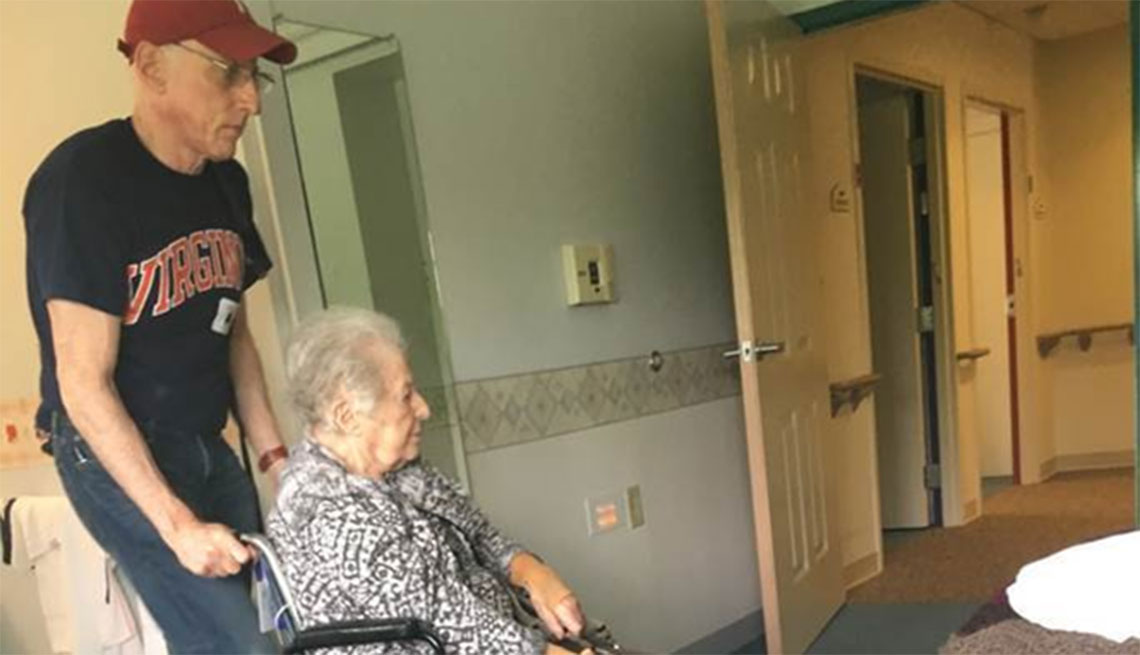On the first anniversary of my mother’s death, I take stock of what I learned
 |
| Courtesy Barry Jacobs Barry Jacobs provided care for his mother, who suffered from kidney failure and vascular dementia. |
There were moments of tenderness, too. We never had a “huggy” relationship or even one in which we talked much. But as we sat silently in the car, sometimes for hours, on the way to visiting her sister or nieces or friends, she would suddenly say “Thank you for driving me” in a clear voice that brought a lump of emotion to my throat. Much later on, as we sat eating lunch together in the sunroom at her nursing home, in the days when her halting speech and fumbling fingers made it evident she was declining, I tried to show her through gently wiping her mouth and touching her shoulder that I understood her fears and sadness and would be there for her.
Anniversaries are times for family caregivers to look back and take the measure of themselves. As the first anniversary of my mother’s death arrives, I’ve been reflecting on the nearly seven years of caregiving I provided for her before her death from complications of vascular dementia and kidney failure. I’ve been asking several questions: What did I learn about myself — good and bad — through this often difficult challenge? How does that matter to me in my life now? What lessons have I gleaned to share with those still in the middle of the daily grind of self-sacrifice and caregiving? Here are some thoughts.
No one should posture as a hero: I used to hate when others would make me out to be some kind of saint for taking care of my mother. They seemed to be making an implicit gender judgment — “It’s so special for a son to be a caregiver” — which I knew from national statistics and my personal experience wasn’t true. I also knew I didn’t act like a saint, and their praise just made me feel guiltier.
In the face of my mother’s sometimes wanton disregard for her health and safety, I acted like a stern taskmaster, forcing her to get out of bed, take her pills and interact with her home health aides. She in turn described me as “sour” to her friends and called me a “bastard” to my face. In hindsight, I should have been gentler, less task-oriented and more patient and sensitive to her feelings. If an iron fist was ever needed, then I should have wrapped it in a velvet glove.
Nor play the victim: Sure, I complained. Sitting for long hours in doctors’ offices and emergency rooms, emptying commodes, and making frequent drugstore runs weren’t particularly fun. But when I invited my mother to move up from Florida to live near me, my wife and kids in Pennsylvania, I kept in mind — just like I counsel my family-caregiver clients — that I had chosen to make a commitment which I had the right to define in more detail. Yes, I would and did give her comfortable shelter, good food and opportunities for company. No, I wouldn’t and didn’t always take her to the concerts, museums and family gatherings to which she wanted to go. I wanted to take care of my mother, and did it my way without feeling too sorry for myself.
Relish the gifts: Even though I’d known my mother all of my life, I learned through caregiving just how tough she was — gumption I now grudgingly admire. Even though I had spent decades working in health care, I learned how many obstacles — such as long wait-times and poor communication systems — we professionals unthinkingly place in the caregivers’ way. Even though I’d written myriad articles and a book on caregiver psychology, I learned just how much anguish and perseverance caregiving can take.
Remember the forest: For me and many others, caregiving is a classic tree-and-forest scenario in which each tree, like each daily task, looms so large that it obscures awareness of the wider terrain and greater mission. I would get so caught up in the day-to-day frustrations of juggling schedules, calling insurers and managing pillboxes that I sometimes lost sight of the purpose for all of my self-sacrifice — to help my mother live as well as possible in her last years. Thankfully, from a full year’s distance, it is the forest, not the trees, that now stands tall in my memory and makes me mostly proud to have been the caregiver I was.
Barry J. Jacobs, a clinical psychologist, family therapist and healthcare consultant, is the co-author of the book AARP Meditations for Caregivers (Da Capo, 2016). Follow him on Twitter @drbarryjacobs and on Facebook.
Full Article & Source:
A Caregiver Looks Back After His Mother’s Death

3 comments:
Thank you sir. I am sorry you lost your Mother and happy you were able to take care of her when she needed you.
Beautifully written article, I can relate to all of this. Thank you for posting.
I took care of my husband for 8 years prior to his passing Feb. 18, 2018. He was my soulmate and a wonderful, loving, peaceful soul. I miss him everyday.
Thank you for your words. I never paid attention to my own feelings during that time. I was too worried about his and wanting to make him happy and comfortable. I felt honored to be his "person", his wife, his best friend... helping him on his final journey.
Saying goodbye to him was the hardest thing I had ever done. I don't know if I could go through that again. I am afraid to love again and I am ok alone with my memories too.
Post a Comment